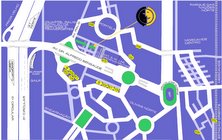
New leopard species found in Borneo
KUALA LUMPUR, Malaysia - The clouded leopard of Borneo — discovered to be an entirely new species — is the latest in a growing list of animals and plants unique to the Southeast Asian country's rainforest and underscores the need to preserve the area, conservationists said Thursday.
Genetic tests by researchers at the U.S.
National Cancer Institute' name=c1> SEARCHNews News Photos Images Web' name=c3> National Cancer Institute revealed that the clouded leopard of Borneo and Sumatra islands is a unique cat species and not the same one found in mainland Southeast Asia as long believed, said a statement by WWF, the global conservation organization.
"Who said a leopard can never change its spots? For over a hundred years we have been looking at this animal and never realized it was unique," said Stuart Chapman, WWF International Coordinator of the Heart of Borneo program, which is dedicated to preserving the flora and fauna in the deep jungles on Borneo.
The secretive clouded leopards are the biggest predators on Borneo, growing sometimes to the size of a small panther. They have the longest canine teeth relative to body size of any cat.
"The fact that Borneo's top predator is now considered a separate species further emphasizes the importance of conserving the Heart of Borneo," Chapman said.
The news about the clouded leopard comes just a few weeks after a WWF report showed that scientists had identified at least 52 new species of animals and plants over the past year on Borneo, the world's third largest island that is shared by Indonesia, Malaysia and Brunei.
The Heart of Borneo, a mountainous region about five times the size of Switzerland covered with equatorial rainforest in the center of the island, is the last great forest home of the Bornean clouded leopard.
Researchers believe that the Borneo population of the clouded leopard likely diverged from the mainland population some 1.4 million years ago.
Over the millennia, at least 40 differences emerged between the two species, making them as distinct as other large cat species such as lions, tigers and jaguars.
The results of the genetic study are supported by separate research on geographical variation in the clouded leopard, based mainly on fur patterns and coloration of skins held in museums and collections.
The Borneo clouded leopard is darker than the mainland species and has many distinct spots within its small cloud markings. It also has a grayer fur, and a double dorsal stripe.
Clouded leopards from the mainland have fewer and fainter markings within large clouds on their skin. They are also lighter in color.
"It's incredible that no one has ever noticed these differences." said Andrew Kitchener from the Department of Natural Sciences, National Museums, Scotland.
A total of 5,000 to 11,000 Bornean clouded leopards are estimated to live in the jungles of Borneo. The total number in Sumatra could be in the range of 3,000 to 7,000 individuals. The cats' biggest threat is destruction of their habitat.
Genetic tests by researchers at the U.S.
National Cancer Institute' name=c1> SEARCHNews News Photos Images Web' name=c3> National Cancer Institute revealed that the clouded leopard of Borneo and Sumatra islands is a unique cat species and not the same one found in mainland Southeast Asia as long believed, said a statement by WWF, the global conservation organization.
"Who said a leopard can never change its spots? For over a hundred years we have been looking at this animal and never realized it was unique," said Stuart Chapman, WWF International Coordinator of the Heart of Borneo program, which is dedicated to preserving the flora and fauna in the deep jungles on Borneo.
The secretive clouded leopards are the biggest predators on Borneo, growing sometimes to the size of a small panther. They have the longest canine teeth relative to body size of any cat.
"The fact that Borneo's top predator is now considered a separate species further emphasizes the importance of conserving the Heart of Borneo," Chapman said.
The news about the clouded leopard comes just a few weeks after a WWF report showed that scientists had identified at least 52 new species of animals and plants over the past year on Borneo, the world's third largest island that is shared by Indonesia, Malaysia and Brunei.
The Heart of Borneo, a mountainous region about five times the size of Switzerland covered with equatorial rainforest in the center of the island, is the last great forest home of the Bornean clouded leopard.
Researchers believe that the Borneo population of the clouded leopard likely diverged from the mainland population some 1.4 million years ago.
Over the millennia, at least 40 differences emerged between the two species, making them as distinct as other large cat species such as lions, tigers and jaguars.
The results of the genetic study are supported by separate research on geographical variation in the clouded leopard, based mainly on fur patterns and coloration of skins held in museums and collections.
The Borneo clouded leopard is darker than the mainland species and has many distinct spots within its small cloud markings. It also has a grayer fur, and a double dorsal stripe.
Clouded leopards from the mainland have fewer and fainter markings within large clouds on their skin. They are also lighter in color.
"It's incredible that no one has ever noticed these differences." said Andrew Kitchener from the Department of Natural Sciences, National Museums, Scotland.
A total of 5,000 to 11,000 Bornean clouded leopards are estimated to live in the jungles of Borneo. The total number in Sumatra could be in the range of 3,000 to 7,000 individuals. The cats' biggest threat is destruction of their habitat.
Fonte: Yahoo News









Sem comentários:
Enviar um comentário